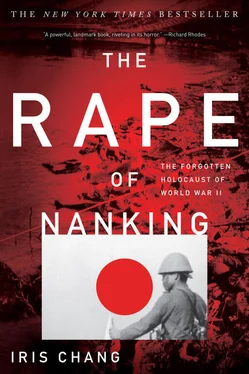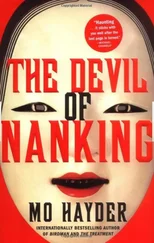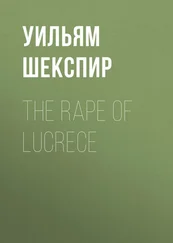I soon had at least part of an answer to the strange riddle of why the massacre had remained relatively untreated in world history. The Rape of Nanking did not penetrate the world consciousness in the same manner as the Holocaust or Hiroshima because the victims themselves had remained silent.
But every answer suggests a new question, and I now wondered why the victims of this crime had not screamed out for justice. Or if they had indeed cried out, why had their anguish not been recognized? It soon became clear to me that the custodian of the curtain of silence was politics. The People’s Republic of China, the Republic of China, and even the United States had all contributed to the historical neglect of this event for reasons deeply rooted in the cold war. After the 1949 Communist revolution in China, neither the People’s Republic of China nor the Republic of China demanded wartime reparations from Japan (as Israel had from Germany) because the two governments were competing for Japanese trade and political recognition. And even the United States, faced with the threat of communism in the Soviet Union and mainland China, sought to ensure the friendship and loyalty of its former enemy, Japan. In this manner, cold war tensions permitted Japan to escape much of the intense critical examination that its wartime ally was forced to undergo.
Moreover, an atmosphere of intimidation in Japan stifled open and scholarly discussion of the Rape of Nanking, further suppressing knowledge of the event. In Japan, to express one’s true opinions about the Sino-Japanese War could be—and continues to be—career-threatening, and even life-threatening. (In 1990 a gunman shot Motoshima Hitoshi, mayor of Nagasaki, in the chest for saying that Emperor Hirohito bore some responsibility for World War II.) This pervasive sense of danger has discouraged many serious scholars from visiting Japanese archives to conduct their research on the subject; indeed, I was told in Nanking that the People’s Republic of China rarely permits its scholars to journey to Japan for fear of jeopardizing their physical safety. Under such circumstances, gaining access to Japanese archival source materials about the Rape of Nanking has been exceedingly difficult for people outside the island nation. In addition, most Japanese veterans who participated in the Rape of Nanking are for the most part unwilling to give interviews about their experiences, although in recent years a few have braved ostracism and even death threats to go public with their stories.
What baffled and saddened me during the writing of this book was the persistent Japanese refusal to come to terms with its own past. It is not just that Japan has doled out less than 1 percent of the amount that Germany has paid in war reparations to its victims. It is not just that, unlike most Nazis, who, if not incarcerated for their crimes were at least forced from public life, many Japanese war criminals continued to occupy powerful positions in industry and government after the war. And it is not just the fact that while Germans have made repeated apologies to their Holocaust victims, the Japanese have enshrined their war criminals in Tokyo—an act that one American wartime victim of the Japanese has labeled politically equivalent to “erecting a cathedral for Hitler in the middle of Berlin.”
Strongly motivating me throughout this long and difficult labor was the stubborn refusal of many prominent Japanese politicians, academics, and industrial leaders to admit, despite overwhelming evidence, that the Nanking massacre had even happened. In contrast to Germany, where it is illegal for teachers to delete the Holocaust from their history curricula, the Japanese have for decades systematically purged references to the Nanking massacre from their textbooks. They have removed photographs of the Nanking massacre from museums, tampered with original source material, and excised from popular culture any mention of the massacre. Even respected history professors in Japan have joined right-wing forces to do what they perceive to be their national duty: discredit reports of a Nanking massacre. In the documentary In the Name of the Emperor, one Japanese historian dismisses the entire Rape of Nanking with these words: “Even if twenty or thirty people had been killed, it would have been a great shock to Japan. Until that time, the Japanese troops had been exemplary.” It is this deliberate attempt by certain Japanese to distort history that most strongly confirmed in me the need for this book.
As powerful as this one factor has been, however, the book is also a response to something quite different. In recent years sincere attempts to have Japan face up to the consequences of its actions have been labeled “Japan bashing.” It is important to establish that I will not be arguing that Japan was the sole imperialist force in the world, or even in Asia, during the first third of this century. China itself tried to extend its influence over its neighbors and even entered into an agreement with Japan to delineate areas of influence on the Korean peninsula, much as the European powers divided up the commercial rights to China in the last century.
Even more important, it does a disservice not only to the men, women, and children whose lives were taken at Nanking but to the Japanese people as well to say that any criticism of Japanese behavior at a certain time and place is criticism of the Japanese as people. This book is not intended as a commentary on the Japanese character or on the genetic makeup of a people who would commit such acts. It is about the power of cultural forces either to make devils of us all, to strip away that thin veneer of social restraint that makes humans humane, or to reinforce it. Germany is today a better place because Jews have not allowed that country to forget what it did during World War II. The American South is a better place for its acknowledgment of the evil of slavery and the one hundred years of Jim Crowism that followed emancipation. Japanese culture will not move forward until it too admits not only to the world but to itself how improper were its actions during World War II. Indeed, I was surprised and pleased by the number of overseas Japanese who attend conferences on the Rape of Nanking. As one suggested, “We want to know as much as you do.”
This book describes two related but discrete atrocities. One is the Rape of Nanking itself, the story of how the Japanese wiped out hundreds of thousands of innocent civilians in its enemy’s capital.
Another is the cover-up, the story of how the Japanese, emboldened by the silence of the Chinese and Americans, tried to erase the entire massacre from public consciousness, thereby depriving its victims of their proper place in history.
The structure of the first part of my book—the history of the massacre—is largely influenced by Rashomon , a famous movie based on a short story (“ Yabunonaka, ” or “In the Grove”) by the Japanese novelist Akutagawa Ryunosuke about a rape-and-murder case in tenth-century Kyoto. On the surface, the story appears simple: a bandit waylays a traveling samurai and his wife; the wife is raped and the samurai is found dead. But the story grows more complex when it is told from the perspective of each of the characters. The bandit, the wife, the dead samurai, and an eyewitness of the crime provide different versions of what happened. It is for the reader to pull all the recollections together, to credit or discredit parts or all of each account, and through this process to create out of subjective and often self-serving perceptions a more objective picture of what might have occurred. This story should be included in the curriculum of any course treating criminal justice. Its point goes to the heart of history.
The Rape of Nanking is told from three different perspectives. The first is the Japanese perspective. It is the story of a planned invasion—what the Japanese military was told to do, how to do it, and why. The second perspective is that of the Chinese, the victims; this is the story of the fate of a city when the government is no longer capable of protecting its citizens against outside invaders. This section includes individual stories from the Chinese themselves, stories of defeat, despair, betrayal, and survival. The third is the American and European perspective. These outsiders were, for one moment at least in Chinese history, heroes. The handful of Westerners on the scene risked their lives to help Chinese civilians during the massacre and to warn the rest of the world about the atrocities being carried out before their very eyes. It is only in the next part of the book, treating the postwar period, that we deal with the convenient indifference of Americans and Europeans to what their own nationals on the scene told them.
Читать дальше











